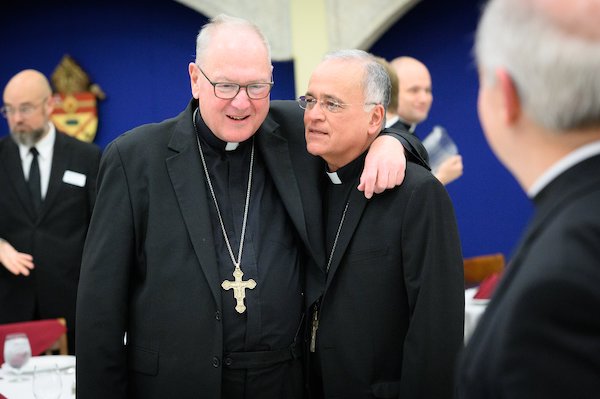
By Tom Tracy
BOYNTON BEACH, Fla. (OSV News) — During a visit to Florida’s St. Vincent de Paul Regional Seminary, Cardinal Timothy Dolan of New York encouraged South Florida Catholics to find a silver lining as they confront declining religious observance, shuttered churches, dioceses in bankruptcy and diminished cultural clout.
Examining the legacy of what he called ‘used-to-be-Catholicism’ — which assumed the cultural acceptance of faith practice that he grew up with during the 1950s and 1960s in his native Midwest — Cardinal Dolan wondered aloud how to overcome negative trends facing the Catholic Church.
“It’s over and we know it, so what now? What takes its place because we are convinced something must and we are speaking about the church?” the cardinal asked during a Jan. 19, 2023 lecture at the Boynton Beach seminary, which serves the dioceses of Florida and is situated near West Palm Beach.
“We are today in what (sociologists) would call a paradigm shift: meaning we have a significant transition in attitude, approach and strategy… about the church. Probably, the most accurate description of that shift is from maintenance to mission,” Cardinal Dolan said.
“I worry many of us bishops and many priests are still in the maintenance mode where we are tending to a museum, taking care of what we had and hoping something comes along to help us,” he said. “And that shift of focus is what Pope Francis means when he summons us frequently and joyfully to ‘missionary discipleship.'”
Cardinal Dolan noted the role that new immigrant arrivals to the U.S., along with population shifts, have brought to parts of the church, including his Archdiocese of New York, where Latino Catholics and others have breathed new life into area churches and schools.
But he said he also has known the pain associated with closing parishes and Catholic schools as society has moved into an era of increased secularism and indifference to tradition and family life.
“If you look at the map of the United States, if you draw a line from Boston to Baltimore, over to St. Louis through Chicago and Milwaukee — that upper quadrant used to be the muscle and wallet of American Catholicism; its demographic is shrinking, to the benefit, by the way, of any diocese in the south and the west,” Cardinal Dolan said.
“But we must move on from a self-referential church: No longer should we be looking constantly within, but looking up to Jesus and out to his people,” the cardinal added, in reference to the teachings of Pope Francis.
The weakening of the institutional church is an invitation to focus on the church’s sacred mission: “Maybe we are better off without silver and gold. We still have the most precious treasure of all: Jesus Christ, without whom nothing is impossible, and he alone is the silver and gold of the church,” Cardinal Dolan added.
“For our clout as Catholics is not in the visible and what we can see and touch, the brick and mortar, the numbers and bank accounts; our only treasure is and always has been invisible: faith, hope, love, joy, the journey, the sacraments, God’s Word, the Eucharist and prayer,” he said. “Our treasure is only Jesus Christ and we have not received him.”
The cardinal’s talk comes as a 2023 study from the National Bureau of Economic Research shows that deaths by drugs, alcohol and suicide, known as “deaths of despair,” dramatically increased among middle-aged, white Americans in the late 20th century due to lower participation in organized religion.
“The impact that we witness seems to be driven by the decline in formal religious participation rather than in belief or personal activities like prayer. These results underscore the importance of cultural institutions such as religious establishments in promoting well-being,” the researchers noted in their paper, “Opiates of the Masses? Deaths of Despair and the Decline of American Religion” by Tyler Giles, Daniel M. Hungerman and Tamar Oostrom.
“Whether other types of voluntary or community activities could have similar large-scale effects on health outcomes is unknown and represents an excellent topic for future research,” the researchers noted.
Referencing an observation attributed to Pope St. Paul VI, Cardinal Dolan noted “when it’s easy to be a Catholic, it’s actually hard to be a good Catholic; and when it’s hard to be Catholic, it’s easier to be a good one.”
The cardinal pointed out that the “used-to-be-Catholicism” that has now passed away came with the comfort of an American culture that held it in “high esteem;” but it was a faith “transmitted not by the depth of interior conviction but as cultural heritage.” He told seminarians to “let that sink in,” emphasizing again “it’s now hard to be a Catholic; so it’s actually easier to be a good one.”
“You seminarians — something tells me you know that,” Cardinal Dolan said. “Now, for you to discern and hold steadfast to a vocation is hard and perhaps your vocation may be more durable.”
